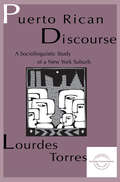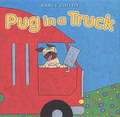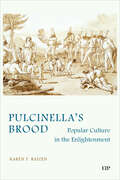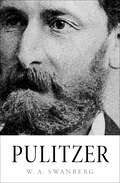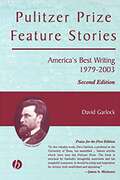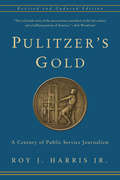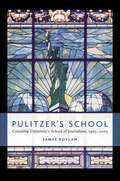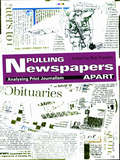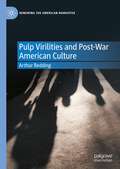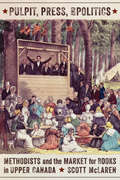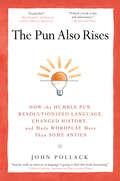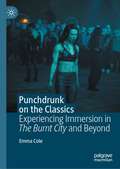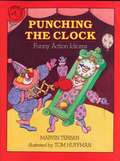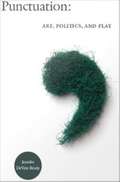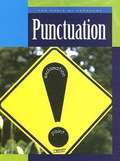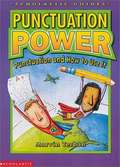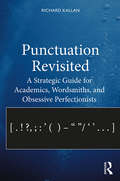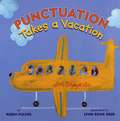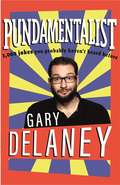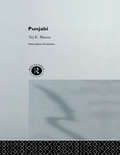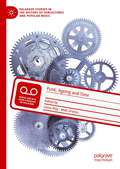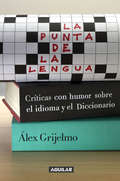- Table View
- List View
Puerto Rican Discourse: A Sociolinguistic Study of A New York Suburb (Everyday Communication Series)
by Lourdes M. TorresBefore conclusions about Spanish in the United States can be drawn, individual communities must be studied in their own contexts. That is the goal of Puerto Rican Discourse. One tendency of previous work on Spanish in the United States has been an eagerness to generalize the findings of isolated studies to all Latino communities, but the specific sociocultural contexts in which people -- and languages -- live often demand very different conclusions. The results of Torres' work indicate that the Spanish of Puerto Ricans living in Brentwood continues to survive in a restricted context. Across the population of Brentwood -- for Puerto Ricans of all ages and language proficiencies -- the Spanish language continues to assume an important practical, symbolic, and affective role. An examination of the structural features of 60 oral narratives -- narrative components and the verbal tenses associated with each, overall Spanish verb use, and clause complexity -- reveals little evidence of the simplification and loss across generations found in other studies of Spanish in the United States. English-dominant Puerto Ricans are able Spanish language narrators demonstrating a wide variety of storytelling skills. The structure of their oral narratives is as complete and rich as the narratives of Spanish-dominant speakers. The content of these oral narratives of personal experience is also explored. Too often in studies on U.S. Spanish, sociolinguists ignore the words of the community; the focus is usually on the grammatical aspects of language use and rarely on the message conveyed. In this study, oral narratives are analyzed as constructions of gendered and ethnically marked identities. The stories demonstrate the contradictory positions in which many Puerto Ricans find themselves in the United States. All of the speakers in this study have internalized, to a greater or lesser extent, dominant ideologies of gender, ethnicity, and language, at the same time that they struggle against such discourse. The analysis of the discourse of the community reveals how the status quo is both reproduced and resisted in the members' narratives, and how ideological forces work with other factors, such as attitudes, to influence the choices speakers make concerning language use. A special feature of this book is that transcripts are provided in both Spanish and English. This volume combines ethnographic, quantitative, and qualitative discourse methodologies to provide a comprehensive and novel analysis of language use and attitudes of the Brentwood Puerto Rican community. Its rich linguistic and ethnographic data will be of interest to researchers and teachers in cultural communication, ethnic (Hispanic-American) studies, sociolinguistics, and TESL.
Pug in a Truck
by Nancy CoffeltPug and his friend travel far and wide. They deliver goods in their big red truck. Sometimes they see toothpicks, and dragon wagons, even ground clouds . . . So hop in-and make sure to keep the shiny side up and the greasy side down. Because when you’re on the road with Pug, there’s plenty of trucker talk and adventure around every corner!
Pulcinella’s Brood: Popular Culture in the Enlightenment (Toronto Italian Studies)
by Karen T. RaizenPulcinella, a Neapolitan clown born of the commedia dell’arte tradition, went viral in Europe in the seventeenth and eighteenth centuries. He was an unlikely hero, grotesque in his mannerisms, with a bulging belly, occasional hunchback, and an insatiable desire for macaroni. Still, this bulbous misfit took his place next to kings, caliphs, and intellectual heavyweights. Pulcinella’s Brood traces the transnational arc of the Enlightenment-era Pulcinella, from his native Naples to Paris, from Rome to London. The book explores how Pulcinella was inserted into discourses about social order, aesthetics, and politics – how he became a revolutionary, a critic of the Catholic Church, and a champion of education. It examines how Pulcinella, along with his transnational brood, was a constant, pervasive presence during the Enlightenment and a squeaky-voiced participant in the ideological and theoretical debates that defined the era. Exploring the diffusion of Italian popular comedy throughout Europe, Pulcinella’s Brood proposes that Pulcinella, a grotesque, food-obsessed clown, can be wielded as a historical disruptor and a rich and dynamic source for casting both the Enlightenment and our contemporary world in a different light.
Pulitzer
by W. A. SwanbergFrom the National Book Award–winning author, an absorbing biography of the esteemed editor, publisher, power broker, and rival to William Randolph Hearst. An eccentric genius, Joseph Pulitzer immigrated to the United States to fight in the Civil War—despite barely speaking English. He would soon master the language enough to begin a successful newspaper career in St. Louis, become a fierce opponent to William Randolph Hearst, and, eventually, found the Columbia School of Journalism. A Hungarian born into poverty, Pulitzer epitomized the American Dream by building a fortune. But he also suffered: going blind in the middle of his career, experiencing extreme mood swings, and developing an intense irritability that made everyday life difficult to tolerate. In this book, W. A. Swanberg—a recipient of the prestigious prize named after Pulitzer—recounts the personal and professional life of the newspaper magnate, as well as his significant influence on American politics. Swanberg reveals how the New York World managed to balance admirably accurate reporting with popular appeal, and explores Pulitzer&’s colorful, contradictory character—courageous and self-pitying, dictatorial and generous. Set against the backdrop of a turbulent era, this is a portrait of an outsize personality by an author with a flair for both the big picture and small, fascinating detail.Includes photographs.Praise for W. A. Swanberg&’s biographies &“First-rate.&” —The New York Times on Citizen Hearst &“Engrossing.&” —Kirkus Reviews on Norman Thomas: The Last Idealist
Pulitzer Prize Feature Stories: America's Best Writing, 1979–2003
by David GarlockAs Garlock relates in the preface, “The quality of the research, reporting and writing of these unique features is stunning. No two are written exactly the same way. But they all hold to one constant: strong emotions and content—powerful, touching, frightening, harrowing journalism.” <p><p> The rules for winning a Pulitzer Prize in feature writing are simple, yet demanding: the prize is awarded for “a distinguished example of feature writing giving prime consideration to high literary quality and originality.” For over two decades, the Pulitzer has been given annually to journalists whose work best exemplifies those high ideals. <p><p> The second edition of Pulitzer Prize Feature Stories: America’s Best Writing is an unabridged collection of this award-winning work, now covering 25 years. Editor David Garlock analyzes each story, and readers are given a glimpse at the circumstances surrounding the narrative. Each feature is followed by an insightful analysis by Garlock that probes the tactics the feature writer used in both writing and reporting the work. Journalism students and experienced professional writers will find Pulitzer Prize Feature Stories an essential compendium of the best feature writing of the last quarter century.
Pulitzer's Gold: A Century of Public Service Journalism
by Roy Harris Jr.The Joseph Pulitzer Gold Medal for meritorious public service is an unparalleled American media honor, awarded to news organizations for collaborative reporting that moves readers, provokes change, and advances the journalistic profession. Updated to reflect new winners of the Pulitzer Prize for public service journalism and the many changes in the practice and business of journalism, Pulitzer's Gold goes behind the scenes to explain the mechanics and effects of these groundbreaking works. The veteran journalist Roy J. Harris Jr. adds fascinating new detail to well-known accounts of the Washington Post investigation into the Watergate affair, the New York Times coverage of the Pentagon Papers, and the Boston Globe revelations of the Catholic Church's sexual-abuse cover-up. He examines recent Pulitzer-winning coverage of government surveillance of U.S. citizens and expands on underexplored stories, from the scandals that took down Boston financial fraud artist Charles Ponzi in 1920 to recent exposés that revealed neglect at Walter Reed Army Medical Center and municipal thievery in Bell, California. This one-hundred-year history of bold journalism follows developments in all types of reporting—environmental, business, disaster coverage, war, and more.
Pulitzer's School: Columbia University's School of Journalism, 1903-2003
by James BoylanMarking the centennial of the founding of Columbia University's school of journalism, this candid history of the school's evolution is set against the backdrop of the ongoing debate over whether journalism can—or should—be taught in America's universities.Originally known as "the Pulitzer School" in honor of its chief benefactor, the newspaper magnate Joseph Pulitzer, Columbia's school of journalism has long been a significant and highly visible presence in the journalism community. But at the turn of the twentieth century, when the school was originally conceived, journalism was taught either during an apprenticeship at a newspaper office or as a vocational elective at a few state universities—no Ivy League institution had yet dared to teach a common "trade" such as journalism. It was Pulitzer's vision, and Columbia's decision to embrace and cultivate his novel idea, that would eventually help legitimize and transform the profession. Yet despite its obvious influence and prestige, the school has experienced a turbulent, even contentious history. Critics have assailed the school for being disengaged from the real world of working journalists, for being a holding tank for the mediocre and a citadel of the establishment, while supporters—with equal passion—have hailed it for upholding journalism's gold standard and for nurturing many of the profession's most successful practitioners.The debate over the school's merits and shortcomings has been strong, and at times vehement, even into the twenty-first century. In 2002, the old argument was reopened and the school found itself publicly scrutinized once again. Had it lived up to Pulitzer's original vision of a practical, uncompromising, and multifaceted education for journalists? Was its education still relevant to the needs of contemporary journalists? Yet after all the ideological arguments, and with its future still potentially in doubt, the school has remained a magnet for the ambitious and talented, an institution that provides intensive training in the skills and folkways of journalism. Granted unprecedented access to archival records, James Boylan has written the definitive account of the struggles and enduring legacy of America's premiere school of journalism.
Pulling Newspapers Apart: Analysing Print Journalism
by Bob FranklinPulling Newspapers Apart: Analysing Print Journalism explores contemporary UK national and local newspapers at a significant and pivotal moment in their development when some pundits are busily, if mistakenly, announcing their demise. The book offers a detailed examination of features which previous studies have tended to neglect, such as editorial formats (News, Op Ed pages, readers’ letters, cartoons, obituaries, advice columns, features and opinion columns), aspects of newspaper design (page layout, photographs, supplements, online editions, headlines, the emergence of the compact and Berliner editions), newspaper contents (sport, sex and Page 3, royalty, crime, moral panics and politics) as well as the content of newspapers which is not generated by in house journalists (advertising, TV listings, horoscopes, agency copy and public relations materials). This innovative and accessibly written collection provides journalism and media students with an invaluable study of newspapers in the digital age.
Pulp Virilities and Post-War American Culture (Renewing the American Narrative)
by Arthur ReddingThis book interrogates the repertoire of masculine performance in popular crime fiction and cinema from the 1940s, 50s, and 60s. This critical survey of the back alleys of pulp culture reveals American masculinities to be unsettled, contentious, crisis-ridden, racially fraught, and sexually anxious. Libertarian in their sensibilities, self-aggrandizing in their sentiments, resistant to the lures of upper mobility, scornful of white collar and corporate culture, the protagonists of these popular and populist works viewed themselves as working-class heroes cast adrift. Pulp Virilities explores the enduring traditions of hard-boiled and noir literature, casting a critical eye on its depictions of urban life and representations of gender, crime, labor, and race. Demonstrating how anxieties and possibilities of American masculinity are hammered out in works of popular culture, Pulp Virilities provides a rich cultural genealogy of contemporary American social life.
Pulpit, Press, and Politics: Methodists and the Market for Books in Upper Canada (Studies in Book and Print Culture)
by Scott McLarenWhen American Methodist preachers first arrived to Upper Canada they brought more than a contagious religious faith. They also brought saddlebags stuffed with books published by the New York Methodist Book Concern – North America’s first denominational publisher – to sell along their preaching circuits. Pulpit, Press, and Politics traces the expansion of this remarkable transnational market from its earliest days to the mid-nineteenth century during a period of intense religious struggle in Upper Canada marked by fiery revivals, political betrayals, and bitter church schisms. The Methodist Book Concern occupied a central place in all this conflict as it powerfully shaped and subverted the religious and political identities of Canadian Methodists, bankrolled the bulk of Methodist preaching and missionary activities, enabled and constrained evangelistic efforts among the colony’s Native groups, and clouded Methodist dealings with the British Wesleyans and other religious competitors north of the border. Even more importantly, as Methodists went on to assume a preeminent place in the province’s religious, cultural, and educational life, their ongoing reliance on the Methodist Book Concern played a crucial part in opening the way for what would later become the lasting acceptance and widespread use of American books and periodicals across the province as a whole.
The Pun Also Rises
by John PollackA former word pun champion's funny, erudite, and provocative exploration of puns, the people who make them, and this derided wordplay's remarkable impact on history. The pun is commonly dismissed as the lowest form of wit, and punsters are often unpopular for their obsessive wordplay. But such attitudes are relatively recent developments. In The Pun Also Rises, John Pollack-a former World Pun Champion and presidential speechwriter for Bill Clinton-explains why such wordplay is significant: It both revolutionized language and played a pivotal role in making the modern world possible. Skillfully weaving together stories and evidence from history, brain science, pop culture, literature, anthropology, and humor, The Pun Also Rises is an authoritative yet playful exploration of a practice that is common, in one form or another, to virtually every language on earth. At once entertaining and educational, this engaging book answers fundamental questions: Just what is a pun, and why do people make them? How did punning impact the development of human language, and how did that drive creativity and progress? And why, after centuries of decline, does the pun still matter? Watch a Video .
Punchdrunk on the Classics: Experiencing Immersion in The Burnt City and Beyond
by Emma ColePunchdrunk on the Classics: Experiencing Immersion in The Burnt City and Beyond draws attention to Punchdrunk’s use of ancient Greek literature in their creation of immersive theatre. The book documents and analyses the effects of utilising Greek tragedy within both Punchdrunk’s creative development windows, and the company’s final staged productions. It features material stretching from The House of Oedipus (2000) right through to The Burnt City (2022-23), on which the author worked as dramaturg. Chapters include rehearsal studies, explorations of how Greek literature can shape an audience’s experience in immersive theatre, and considerations of how The Burnt City might change our understanding of the poetics of immersion in antiquity. Overall, Punchdrunk on the Classics provides an unparalleled depth of insight into an individual Punchdrunk production, and highlights the until-now overlooked significance of antiquity within Punchdrunk’s practice.
Punching the Clock: Funny Action Idioms
by Marvin TerbanIntroduces and explains action idioms and their origins with comical illustrations that lend a literal interpretation.
Punctuation: Art, Politics, and Play
by Jennifer Devere BrodyIn Punctuation: Art, Politics, and Play, Jennifer DeVere Brody places punctuation at center stage. She illuminates the performative aspects of dots, ellipses, hyphens, quotation marks, semicolons, colons, and exclamation points by considering them in relation to aesthetics and experimental art. Through her readings of texts and symbols ranging from style guides to digital art, from emoticons to dance pieces, Brody suggests that instead of always clarifying meaning, punctuation can sometimes open up space for interpretation, enabling writers and visual artists to interrogate and reformulate notions of life, death, art, and identity politics. Brody provides a playful, erudite meditation on punctuation's power to direct discourse and, consequently, to shape human subjectivity. Her analysis ranges from a consideration of typography as a mode for representing black subjectivity in Ralph Ellison's Invisible Man to a reflection on hyphenation and identity politics in light of Strunk and White's prediction that the hyphen would disappear from written English. Ultimately, Brody takes punctuation off the "stage of the page" to examine visual and performance artists' experimentation with non-grammatical punctuation. She looks at different ways that punctuation performs as gesture in dances choreographed by Bill T. Jones, in the hybrid sculpture of Richard Artschwager, in the multimedia works of the Japanese artist Yayoi Kusama, and in Miranda July's film Me and You and Everyone We Know. Brody concludes with a reflection on the future of punctuation in the digital era.
Punctuation (The Magic of Language)
by Ann HeinrichsExclamation points, periods, question marks, and commas- all these are common forms of punctuation, and each has the potential to prove confusing to kids learning grammar.
Punctuation Power: Punctuation And How To Use It
by Marvin TerbanPuncuation Power, the newest paperback Scholastic Guide, is a guide to all of the punctuation 8 to 14-year-olds (and most adults) need. It uses a clever format that is fun and informative. Knowing how to puncuate sentences properly is a skill that can help any writer communicate more clearly. PUNCTUATION POWER presents kids with the information they need to become better punctuators. Terban's voice is both energetic and fun. Now available in paperback, this guide can be put in school bags and brought to school, the library, or anywhere else a child would need it.
Punctuation Revisited: A Strategic Guide for Academics, Wordsmiths, and Obsessive Perfectionists
by Richard KallanPunctuation Revisited is an advanced, comprehensive guide to the importance of punctuation in conveying meaning and augmenting the power of a message. Richard Kallan provides guidance on how to structure sentences accurately and in a manner that enhances their readability and rhetorical appeal. This book discusses in fine detail not just when and how to employ specific punctuation marks, but the rationale behind them. It also notes when the major academic style manuals differ in their punctuation advice. These unique features are designed to benefit beginning, intermediate, and advanced students of standard punctuation practice. Punctuation Revisited is a wonderful resource for students of composition and writing, an essential read for writing center tutors and faculty, as well as the perfect addition to anyone’s professional library.
The Punctuation Station
by Brian P. ClearyAll aboard! Join a family of giraffes on their journey to Punctuation Station. As the train chugs along, you ll learn the ins and outs of using periods, commas, apostrophes, question marks, hyphens, quotation marks, and exclamation points! Playful rhymes from Brian P. Cleary and colorful illustrations from Joanne Lew-Vriethoff make learning about punctuation fun. So hop on board - this is one train ride you don t want to miss!
Punctuation Takes a Vacation
by Robin Pulver Lynn Rowe ReedMr. Wright's class can't believe it. What will it be like without question marks, apostrophes, periods, and commas? Punctuation has never been as entertaining as it is in this wacky picture book.
Punctuation Takes a Vacation
by Robin Pulver Lynn Rowe ReedMr. Wright's class can't believe it. What will it be like without question marks, apostrophes, periods, and commas? Punctuation has never been as entertaining as it is in this wacky picture book.
Pundamentalist: 1,000 jokes you probably haven't heard before
by Gary Delaney'For a collection of good old-fashioned gags, it's one of the best out there, a rich buffet of inventive wordplay that's best savoured a little at a time to fully appreciate the joy of these perfectly-constructed morsels. For original, hilarious gags you'll want to share, this is the real deal.' - Chortle 'A rollicking joyride. . . Pundamentalist has puns for the whole family: rude ones, daft ones, deft ones, stinkers and absolute belters.' - British Comedy GuideGary Delaney, one-liner extraordinaire, has appeared on shows like Mock the Week and written for the likes of Jimmy Carr, Jason Manford, and James Corden. Now, for the first time, comes the first collection of his finest jokes. Featuring the likes of: Garden centres can't reopen fast enough for me, I've been living on borrowed thyme.We can't even afford a garden, so when my girlfriend bought us a trampoline I hit the roof.Sure everyone cares about straws killing dolphins now, but they've been breaking camels' backs for years.Genius is 1% inspiration and 99% perspiration, which explains why Prince Andrew is so stupid.Sad news: The British simile champion has died. We shall not see his like again.My mom doesn't trust my dad's secretary. I asked her why, and she just said 'I've seen her type before'.Today someone told me that I look good with a salt 'n' pepper beard, so I took that as a condiment.My French pen friend just said 'Le Monde', which means the world to me. Can anyone tell me what FOMO stands for? Everyone else seems to know.Actors have got Equity, Magicians have got the Magic Circle, but it's a shame ventriloquists don't have anyone to speak for them.Does anyone know if it's safe to dye your pubes? It's a bit of a grey area.And make sure you look out for Gary's next book, about Stockholm Syndrome: it starts off badly but by the end you'll really enjoy it . . .
Pundamentalist: 1,000 jokes you probably haven't heard before
by Gary Delaney'For a collection of good old-fashioned gags, it's one of the best out there, a rich buffet of inventive wordplay that's best savoured a little at a time to fully appreciate the joy of these perfectly-constructed morsels. For original, hilarious gags you'll want to share, this is the real deal.' - Chortle 'A rollicking joyride. . . Pundamentalist has puns for the whole family: rude ones, daft ones, deft ones, stinkers and absolute belters.' - British Comedy GuideGary Delaney, one-liner extraordinaire, has appeared on shows like Mock the Week and written for the likes of Jimmy Carr, Jason Manford, and James Corden. Now, for the first time, comes the first collection of his finest jokes. Featuring the likes of: Garden centres can't reopen fast enough for me, I've been living on borrowed thyme.We can't even afford a garden, so when my girlfriend bought us a trampoline I hit the roof.Sure everyone cares about straws killing dolphins now, but they've been breaking camels' backs for years.Genius is 1% inspiration and 99% perspiration, which explains why Prince Andrew is so stupid.Sad news: The British simile champion has died. We shall not see his like again.My mom doesn't trust my dad's secretary. I asked her why, and she just said 'I've seen her type before'.Today someone told me that I look good with a salt 'n' pepper beard, so I took that as a condiment.My French pen friend just said 'Le Monde', which means the world to me. Can anyone tell me what FOMO stands for? Everyone else seems to know.Actors have got Equity, Magicians have got the Magic Circle, but it's a shame ventriloquists don't have anyone to speak for them.Does anyone know if it's safe to dye your pubes? It's a bit of a grey area.And make sure you look out for Gary's next book, about Stockholm Syndrome: it starts off badly but by the end you'll really enjoy it . . .
Punjabi (Descriptive Grammars)
by Tej BhatiaFirst Published in 1993. Punjabi is the language of the Punjab-the land of five rivers--of northern India and Pakistan. Primarily written in three distinct scripts, a unique feature of the language is that, along with Lahanda and the Western Pahari dialects, it is the only modern Indo-European language spoken in South Asia which is tonal in nature. It is recognized as one of the several national languages of India and Pakistan, and approximately forty-five million people speak Punjabi as either a first or second language. This Descriptive Grammar accounts for the linguistic and sociolinguistic properties of Punjabi and Lahanda/Multani. It explores the standard language, giving a comprehensive account of syntax, morphology and phonology. With a descriptive, typological and cognitive examination of the language, this is the most up-to-date, comprehensive and authoritative description of modern Punjabi to date. This volume will be invaluable to students and researchers of linguistic theory and practice.
Punk, Ageing and Time (Palgrave Studies in the History of Subcultures and Popular Music)
by Laura Way Matt GrimesTo date there has been no plotting of punk scholarship which speaks to ‘time’, yet there are some clear bodies of work pertaining to particular issues relevant to it, including ageing and/or the life course and punk, memory and/or nostalgia and punk, ‘punk history’, and archiving and punk. Punk, Ageing and Time is therefore a timely (pun intended) book. What this edited collection does for the first time is bring together contemporary investigations and discussions specifically around punk and ageing and/or time, covering areas such as: punk and ageing; the relationship between temporality and particular concepts relevant to punk (such as authenticity, DIY, identity, resistance, spatiality, style); and punk memory, remembering and/or forgetting. Multidisciplinary in nature, this book considers areas which have received very little to no academic attention previously.
La punta de la lengua: Críticas con humor sobre el idioma y el Diccionario
by Álex GrijelmoLa punta de la lengua reúne comentarios sueltos que caminan sobre el filo del idioma, esa zona donde se producen los cambios de palabras o de significados y donde brotan cientos de dudas. Pero estos comentarios separados e independientes entre sí, que se pueden leer a saltos, tienen un hilo común: la denuncia del deterioro que se va registrando en nuestra lengua, su reflejo en los periódicos, en los discursos, en las letras de canciones# y su entrada en el Diccionario. ¿Sabe usted que ahí se encuentran ya palabras como #overbooking#, #esponsorización# o #filin## o que no se diferencia en él entre #indio# e #hindú#, o entre #ingresar# y #entrar#? Otra línea común envuelve en un mismo paquete todas las páginas de este libro: el desenfado en los juicios, los ejemplos divertidos y el ánimo de no tener necesariamente la razón. Se suceden así los #medicanismos#, los #periodistismos#, los #avionismos## y toda suerte de desatinos que proceden de éstas y otras profesiones. Ytambién un original capítulo que reúne más de cuarenta famosas canciones cuyas letras tienen errores gramaticales o léxicos. ¿Conoce usted los fallos que se deslizaron en Mediterráneo, o Gwendoline, o en Aquellas pequeñas cosas, o Cara de gitana, o en Sámbame, o Devuélveme la vida#? El libro termina con un pequeño «Diccionario de palabras moribundas», cuyo repaso puede constituir un completo ejercicio de nostalgia. Álex Grijelmo camina por estos terrenos con la conciencia de que recorre palabras difíciles, dudas razonables: todas esas expresiones que tenemos a menudo en la punta de la lengua y que no siempre nos atrevemos a pronunciar.
